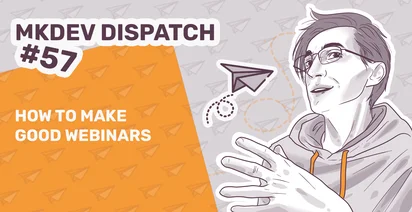How to Make Good Webinars | ✉️ #57

Hey! 👋
I've just witnessed what really sets an expert apart from an ordinary professional. Paul Larsen, our Head of AI, and I decided to host a webinar and record it live. What inspired me the most was how you can set a topic, show a few headlines to an expert, and they can go on for almost 1.5 hours, practically non-stop, delivering top-notch content that could be broken down into quotes, packaged into articles, and sold as subscription material to business owners — it’s that valuable. And the best part is, this knowledge doesn’t come from books or theory, but from hands-on experience, accompanied by real-life cases and anecdotes. I genuinely enjoyed the process of recording this webinar.
Yes, I know this might sound like blatant advertising, but it’s partly because I’m proud of the result and want to share it. I compare it to the webinars I’ve watched or seen promoted online, which unfortunately often turn out to be pretty dry, dull, and overly corporate. I wanted to try something different. I hope we succeeded. Now, what’s this webinar, and why haven’t I shared the link yet? Well, the thing is, you kinda missed it… It was today, just a few hours before this newsletter was sent out. So, if you’re curious to see what we came up with, you’ll have to watch the recording. By the way, let’s see how hard it is to find webinars on our site and register for them. Let me know if you managed to do it, because I feel this process might need a bit of improvement. See you!
What We've Shared
DevOps Accents #49: How to build your team? How to manage engineers and developers? Can you hire one magical being that can do it all and forget all about it? (Spoiler: No, no you can’t). In episode 49 of DevOps Accents Leo and Pablo talk to Elin Brusberg, Head of Development at Vitec Megler.
Predictive Maintenance with Data Analytics and the Future of Electric Aircraft: Our guest for the previous episode of DevOps Accents is Ignacio Echavarría from Dovetail Electric Aviation. Here's a shorter highlight of that conversation.
The End of Internet Search as We Know It. Bye Google: In his latest piece, Pablo Inigo Sanchez explores Stack Overflow's evolution and its partnership with giants like Google & OpenAI. With over 58M Q&As fueling AI models, he questions the implications for user-contributed content and the platform's future in an AI-centric world.
Deploying GKE Clusters with Terraform: Discover how to deploy a GKE cluster using Terraform! We walk through using basic and advanced configurations with hands-on examples to set up your Google Kubernetes Engine effectively. Dive into our tutorial for practical insights.
What We've Discovered
Announcing AWS Neuron Helm Chart: New Helm chart that streamlines deployment of Neuron components to EKS. That should help to standardize running training or inference on your clusters.
Migrating from AWS App Mesh to Amazon VPC Lattice: Good call from AWS to deprecate one of two service mesh offerings that they have. Lattice looked like a more sane option from the start, except the lackluster support of ECS.
Is your "blameless" culture really blameless? Three good examples of when you might still be not quite embracing the blameless culture.
Thermal design supporting Gen 12 hardware: cool, efficient and reliable. Reading about heat distribution design gives similar level of entertainment as videos about air flow in racing cars. Fascinating engineering from CloudFlare, worth reading even if you are not touching the hardware that often.
Introducing Netflix’s TimeSeries Data Abstraction Layer: As always, an excellent deep dive into one of the massive components of Netflix, handling millions of events per second.
A random reminder
If you you feel that YouTube is for long-form content only and skip YouTube Shorts, but are still interested in clips from our podcast, subscribe to our Instagram page and watch them as Reels there! Add some DevOps and Cloud to your Insta timeline.
The 58th mkdev dispatch will arrive on Friday, November 22nd. See you next time!
